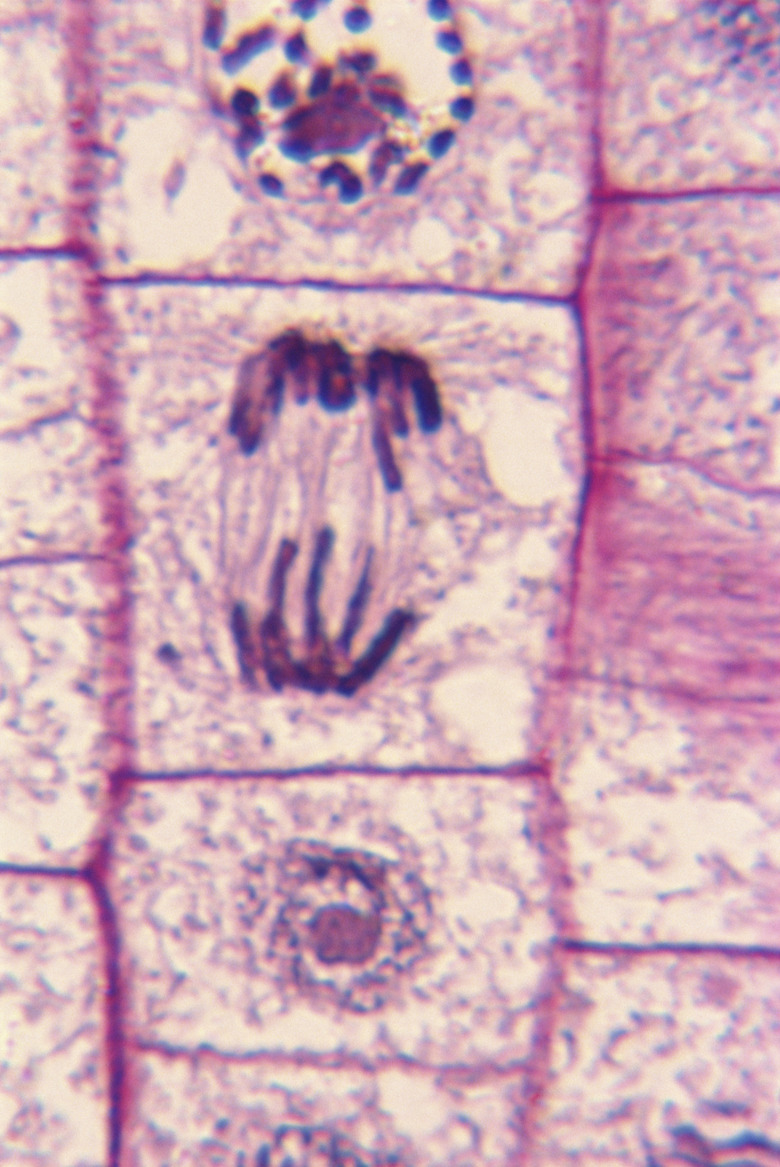Why Are Chromosomes Important For Cell Division?
The fundamental importance of chromosomes is that they contain DNA, or deoxyribonucleic acid, the substance that contains every organism's genetic code. When a cell divides, its chromosomes must first replicate. Cells divide in two basic ways – mitosis and meiosis. The latter type of division incorporates the former.
Which type of division chromosomes undergo depends on the type of cell that is dividing. Most cells divide via mitosis, and all prokaryotic cells reproduce by a process very similar to mitosis called binary fission. Certain cells involved in the process of sexual reproduction, however, rely on meiosis. It is important that chromosomes replicate properly so that each resulting cell has the correct amount of DNA after division
Chromosomes
Chromosomes
Chromosomes are tightly packed structures than contain chromatin, or DNA wrapped around a proteins called histones. They reside in the nuclei of eukaryotic cells, whereas the DNA of prokaryotic cells in the cytoplasm, as these cells do not have nuclei or other membrane-bound organelles.
All human cells except for egg cells and sperm cells have 46 chromosomes, the diploid human number. Gametes (sex cells) have 23 chromosomes, the haploid human number; everyone is the product of the fusion of an egg cell and a sperm cell, and when these combine, the result is the normal amount of chromosomes, 46.
The 22 non-sex chromosomes assume well-studied forms on microscopy and are numbered 1 through 22. Corresponding paternal and maternal chromosomes are known as homologous chromosomes (that is, the chromosome 8 you got from your mother and the copy you got from your father are homologous chromosomes, or simply homologs).
When individual chromosomes are replicated (duplicated), they remain joined at a constriction point known as the centromere. This complex has two arms extending in opposite directions from the centromere. The short arms are known as the "p arms" and the long arms are called the "q arms." Chromosomes become even more tightly packed during cell division, making them visible under a microscope.
Cell Division
Cell Division
As noted, there are two types of cell division: mitosis and meiosis. Mitosis is the most common type of cell division, as it creates new body cells, whereas cells undergo meiosis only to make new egg and sperm cells. Cells in some tissues divide continuously (e.g., skin); those in other tissues do not (e.g., liver, heart, kidney).
A cell completely replicates itself during mitosis and then divides into two daughter cells. Each daughter cell is identical to the parent cell and after cell division, each daughter cell contains the same number of chromosomes as the parent and the other daughter cell. During meiosis, four daughter cells are created, each with half the number of chromosomes as the parent cell.
DNA Replication in Mitosis
DNA Replication in Mitosis
DNA replication is an essential part of both mitosis and meiosis. It ensures that each daughter cell has the correct number of chromosomes. To replicate the DNA in mitosis, each chromosome replicates so that the new chromosome is attached to the original one at the centromere. The two chromosomes are called sister chromatids. They divide in two before the cell divides, and each daughter cell gets one chromosome from each of the sister chromatids.
DNA Replication in Meiosis
DNA Replication in Meiosis
Meiosis is more complicated that mitosis and requires two cell divisions. In the first stage, the chromosomes replicate as in mitosis. However, then the chromatid arms of sister chromatids may overlap with other sister chromatids and cause crossovers — swapping of DNA between chromatids, so that the each chromatid is no longer identical to its sister. The cell then divides twice, so that the sister chromatids separate and the daughter cells have 23 chromosomes each.
Cite This Article
MLA
Woodhouse, Emma. "Why Are Chromosomes Important For Cell Division?" sciencing.com, https://www.sciencing.com/chromosomes-important-cell-division-8774204/. 31 July 2019.
APA
Woodhouse, Emma. (2019, July 31). Why Are Chromosomes Important For Cell Division?. sciencing.com. Retrieved from https://www.sciencing.com/chromosomes-important-cell-division-8774204/
Chicago
Woodhouse, Emma. Why Are Chromosomes Important For Cell Division? last modified August 30, 2022. https://www.sciencing.com/chromosomes-important-cell-division-8774204/
